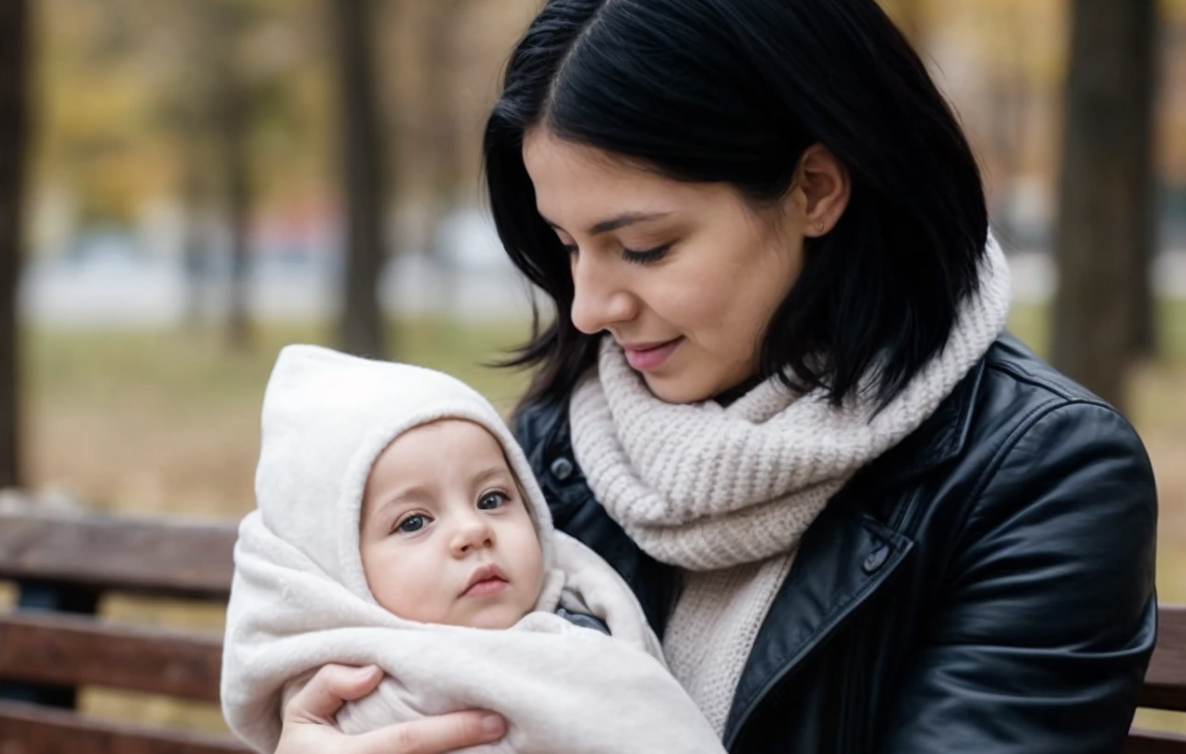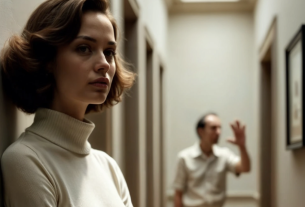That evening was woven from silence and autumn chill.
Anna, who had stayed late at the library finishing the annual reports before a strict inspection, was walking the short way home through the park. The air was thick and damp, smelling of damp leaves, smoke from distant chimneys, and something bitter-spicy that late October always brings with it. The streetlights cast uneven circles of light on the ground, where leaves slowly swirled. In this world made of half-darkness and quiet, she felt at home—just as muted and a little sad.
Her life flowed evenly and predictably, like the ticking of the old wall clock in her apartment, and she had long since stopped expecting any surprises from fate, whether joyful or bitter.
Anna flinched, sharply breaking out of the stream of thoughts about the unfinished report.
A piercing screech of brakes, harsh and out of place, burst into the harmony of the evening. It came from a dark, expensive foreign car that had slowed by the curb right opposite the entrance to the park. Anna froze, instinctively pressing herself against the rough trunk of an old maple, a sudden chill of anxiety running down her spine.
From the car, like a shadow, slipped out a young woman. Tall, slender, wrapped in a long dark coat. She was holding something against her chest—not a bundle, exactly, but more like a small blanket, carefully wrapped, as if something fragile and priceless was hidden inside. The girl looked around. Anna had just enough time to notice her pale, almost white face, tense, with bright scarlet lips. Then the stranger hurried off into the depths of the park, almost running along the central path, dissolving into the thickening twilight.
Something was wrong in this picture—in that haste, in that unnatural gleam of her eyes that flashed in the light of the streetlamp. Curiosity, sharp and aching, pricked Anna under the ribs. What could someone be doing in an empty autumn park at midnight, looking as if their life depended on it?
She wasn’t thinking about danger; something else was driving her—a long-forgotten feeling of being involved in someone else’s clearly troubled fate, something that stirred in the depths of her quiet, orderly soul. After a brief pause, Anna began to follow along the same path, moving stealthily, feeling her heart beating faster in time with her soundless steps.
It seemed to her that the stranger had turned toward one of the benches in the very center of the park, by an old, sprawling fir tree. She lingered there for only a few seconds and then just as quickly rushed back. Anna hid behind a lilac bush, hearing only the distant slam of a car door and the purr of an engine driving away.
Silence closed in again, but now it was different—watchful, viscous, filled with unspoken questions.
Anna stepped out of her hiding place and slowly walked over to that bench. On the dark, damp boards lay a bundle. The very one the stranger had been clutching to her chest. And from it… from it came a quiet, plaintive sound. Not crying—no—but a tiny squeak, like from a lost kitten, small and defenseless.
Anna’s heart began pounding somewhere in her throat. She stepped closer, unable to believe her eyes. Carefully, with trembling fingers, she pulled back the edge of the soft blanket, and the air caught in her chest.
Looking up at her were the clear blue eyes of an infant. He wasn’t crying, only softly whimpering, pressing his little face into the folds of the fabric, his tiny fingers gripping the edge of the blanket.
Anna looked around. The park was empty. The world had shrunk to the size of this bench, to this little abandoned creature. Her thoughts tangled, and in her temples one thought beat over and over:
“My God, my God… Who could do something so cruel?”
Without thinking, moved by some deep, maternal instinct, she scooped up the bundle. It was surprisingly light and warm—a living little ball pressing against her in search of warmth and protection. And then she ran.
Not to the police, not to people—to home. To the only safe place she had left, to her small world, which was about to turn upside down.
Her apartment was a small museum of memory. Two rooms in a Khrushchev-era block, painfully familiar from childhood. It smelled of old books, of jam her grandmother used to cook, and of silence.
Her grandmother, Marya Petrovna, a retired literature teacher, had raised her alone, instilling in her not a passion for clothes and parties, but a love for Tolstoy and Dickens. They had lived in perfect harmony, and after her death a year ago, Anna had been left alone, like a solitary ship moored to an empty pier. Working at the library had become not just a job but a refuge, a place where time moved slowly and predictably.
She locked the door with all the locks and leaned her back against it, trying to catch her breath. Then, on tiptoe, as if afraid to wake someone, she carried the bundle to the couch and unwrapped it under the light of the desk lamp.
The baby—a boy, judging by the tiny blue romper—was asleep, softly snuffling. His face was beautiful, almost porcelain, with long eyelashes casting shadows on his cheeks. Anna couldn’t tear her eyes away from him. On his neck, on a thin leather cord, hung a cross. Not a simple church one, but a piece of astonishing craftsmanship, with a small sapphire that shimmered in the lamplight. It wasn’t just a trinket; it was a sign. A seal left by someone else’s fate.
“What am I supposed to do with you?” she whispered, and her voice sounded strange and shaky, as if it belonged to someone else.
“Stop!” Anna suddenly thought clearly. “To them!”
Her neighbors, Verochka and her husband Mikhail, the local district police officer, were those rare people with whom you end up having not just good-neighborly but almost family ties. Verochka—loud, kind, and practical—often dropped by “for five minutes” with a pie, and solid, dependable Mikhail helped with any “man’s work” around the house.
Without slowing down, Anna ran out onto the landing and knocked on their door.
Mikhail opened, standing there in a stretched-out home T-shirt, with a TV remote in his hand.
“Anna, what’s happened? You’re white as a sheet!”
“Misha, there… I found… a baby. In the park. Abandoned,” she blurted out, and only then did she start to shake violently, her vision dimming from the wave of weakness that crashed over her.
A minute later they were in her apartment. Verochka gasped and rushed straight to the couch.
“Oh my God, poor little thing! He’s frozen through! Mikhail, look at him!”
Mikhail, now focused and serious, examined the child. His face turned hard, professional.
“Anna, you did well not to panic. I’ll call the duty station now, find out what’s what… We need to understand what situation we’re dealing with.”
It turned out that, so far, no one had reported a missing child. Mikhail suggested they take the baby to the hospital to be checked over, to make sure everything was okay, and then hand him over to the duty officer.
“No!” Anna said sharply, surprising even herself. “I mean… Yes, we’ll go to the hospital. But look at him. He’s so tiny… The hospital, an orphanage… Please, let me stay with him. I’m on leave right now. I can’t just give him away like that.”
Verochka and Mikhail exchanged glances. He sighed, understanding that arguing would be pointless.
“Fine, we’ll sort something out. I’ll send Lena from the duty office over tomorrow; she’ll do all the paperwork. They’ll register you as a temporary guardian while they investigate.”
“Vera, run to the 24-hour store, buy formula, diapers, whatever else he needs… I’ll call my people again, maybe someone’s already looking for him…”
Verochka dashed off to the shop, and Mikhail went into the next room to call his colleagues.
Anna was left alone with the baby. She picked him up and pressed him to her chest. He was so fragile, so defenseless, and his warmth seeped through the fabric of her blouse, warming something frozen inside her.
And then something strange happened. Inside her, in that emptiness that had formed after her grandmother’s death and years of loneliness, something shifted. A strange, aching feeling of calm, of peace and… purpose appeared. She felt light. Light in a way she hadn’t felt in a long time, as if she had finally found what she had unconsciously been searching for all these years.
A week passed. Then a second. Anna got used to the baby. Mikhail arranged everything so that the boy was temporarily, until the circumstances were clarified, placed in her care. Lena from the duty office dropped by every day to check on the child, amazed at how calm and well-looked-after he was.
No missing child reports came in.
The boy, whom Anna secretly called Artyom, after the hero of her favorite novel, grew by leaps and bounds. He already recognized her, smiled his toothless smile, and grasped her finger with his tiny hand. The apartment filled with new sounds—baby babble, the click of the washing machine door, the smell of baby soap and warm milk.
For the first time in the year since her grandmother’s passing, Anna felt alive, felt that someone truly needed her. She bought him onesies and diapers, hung a mobile over his crib. It was happiness. Frightening, illegal, “wrong” happiness—but still happiness.
She caught herself thinking that she was afraid of the day when they would come for him.
And then, one day, as she was feeding Artyom from a bottle, the doorbell rang. Not the usual light knock of neighbors, but a persistent, official ring. Anna’s heart sank, turning into a heavy, cold stone. She opened the door, already expecting something bad.
On the doorstep stood Mikhail. And with him—a stranger. Tall, athletic, in an expensive but somewhat rumpled coat. Tired, unshaven, with feverish eyes burning with a mixture of despair and hope.
“Anya, it looks like we’ve found the baby’s father,” Mikhail said quietly, but there was a note of uncertainty in his voice, as if he himself wasn’t entirely sure that what was happening was right.
The stranger, without waiting to be invited, gently but firmly moved Mikhail aside and stepped into the hallway. His gaze immediately fell on the couch where Artyom lay.
“Maxim…” he whispered, and in that whisper there was all the pain in the world, all the nights spent in agonizing searches.
He walked into the room and sank to his knees in front of the couch, freezing for a moment as if afraid the vision would vanish. Then, with a trembling hand, he touched the child’s cheek, carefully, reverently. In his sleep, the baby scrunched up his face and smacked his lips. The man gently pulled back the collar of the romper. His gaze fell on the cross with the sapphire. He went still, studying it, and then his shoulders shook with a silent sob.
“Mine,” he said quietly, but with such incredible certainty that there could be no doubt. “My son.”
They went into the kitchen. The man introduced himself—Dmitry Sergeyevich Orlov. He spoke quietly, in short bursts, swallowing his words; his story sounded like a confession.
“My wife, Lena… she’s gone… The birth was difficult… Maxim was born weak. I… I just couldn’t pull myself together. Work was my only salvation. My secretary, Alina, started helping. At first with work, then with the household, with the baby. She found a nanny, supposedly a reliable one. I trusted her…”
He ran his hand over his face, and Anna noticed his fingers were trembling, with fresh scratches on the knuckles.
“I flew out on an urgent business trip. Called every day. Everything was fine. But when I came back… there was no one at home. No nanny, no son. When I questioned Alina, she dodged my questions, said the nanny turned out to be unreliable, that she’d probably stolen something and run off with the child. I called every hospital, every morgue… Filed a missing person report with the police. Mikhail told me how you found my son. It was Alina… I recognized her from the description, and the car is hers too.”
Dmitry paused, his gaze turning hard as stone.
“Alina, my secretary, was… infatuated with me. While I was away, I let slip in conversation that I wasn’t ready for a new relationship, that I couldn’t even think about it yet. Apparently, that hurt her. Badly. She fired the nanny and paid her to keep quiet. She decided to get back at me. So that I would have nothing left tying me to my old life. So that, emptied out, I’d come to her for comfort. Cold, monstrous calculation.”
He looked at Anna, and in his eyes there was gratitude mixed with pain and shame.
“I filed the report about the missing child. And described the cross… It was made especially for Lena when we were expecting the baby. There isn’t another one like it in the world. Thank you. You didn’t just save him… You saved me. You gave me a chance to keep living.”
Dmitry took Maxim home. The apartment fell quiet again.
The silence that had once been cozy now pressed down on her, ringing and dead. Anna tried to return to her old life—to books, to reports—but everything now seemed pointless, dull, and uninteresting. She kept seeing his face—frightened, grateful, filled with pain. Those blue eyes, just like Maxim’s.
She missed that warm little bundle that had pressed against her at night.
And two weeks later, he came back. Alone. With flowers and an embarrassed expression, looking like a teenager confessing his first love.
“Anna, forgive me, but I have to ask for your help. I can’t hire a nanny. The thought that I could just lose my son again… I… I’ve been taking care of him myself these days, I’ve neglected work completely… I want to offer you a job. As Maxim’s nanny. Live-in. You’ll be able to be with him all the time. I’ve seen how he reaches for you, how he smiles at you. I trust you.”
It was far too much like the plot of a cheap romance novel. He turned out to be a successful businessman. And she—the Cinderella.
But there was no arrogance or calculation in his eyes. Only desperate hope and that same still-raw wound that she instinctively understood.
Anna agreed.
At first, it was strange. Moving into a large house that seemed cold at first glance, into a world where everything was different—from the interior to the daily routine. But her world was Maxim. And with him, Dmitry.
They existed in some new, fragile rhythm. He worked, she took care of the baby. In the evenings, they would come together in the kitchen. He talked about Lena, about his pain, about his fears. She talked about her grandmother, about books, about her quiet loneliness.
They opened up to each other not as employer and employee, but as two lonely ships that had finally found a harbor after a long voyage through stormy seas.
Dmitry was surprised to discover that behind Anna’s simplicity and modesty there was a deep, subtle mind and incredible inner strength. She didn’t try to replace his wife; she simply stayed by his side. Healing him with her calm, her sincerity, her quiet but unshakable faith that life, despite everything, was beautiful.
One evening, when Maxim was already asleep, they were sitting in the living room. Outside, the first snow was falling, large fluffy flakes drifting slowly down, wrapping the city in a white blanket.
“You know, this cross…” Dmitry said softly. “Lena used to say it had power. That it would lead our son to the woman who would become his true mother. It led you to him that evening. And led you to me. It was a sapphire trail that brought me to my happiness.”
He took her hand. His fingers were warm and firm, and in his eyes shone that same hope that had once saved him from despair.
“Anna, I didn’t offer you a job. Now I’m offering you… us. Our family. Marry me. Become Maxim’s mother in truth. I love you.”
Tears sparkled in her eyes. But these were tears of happiness—the kind that thaw frozen hearts and give life to new shoots of hope. She nodded, unable to say a word, and her fingers closed around his hand in an answering grip that promised forever.
They married quietly, without pomp, in a small circle of their closest people. Mikhail and Verochka were their witnesses. Maxim was the most finely dressed guest.
And the happiness that settled in their home was quiet, deep, and real.
Her life changed. But Anna did not stop being herself. She didn’t suddenly start wearing designer outfits or turn into a socialite. She simply stopped being invisible. Her refinement and modesty became her inner core, her strength. She turned the big house into a cozy nest filled with books, a child’s laughter, and that special warmth that exists only in a real family, where everyone is loved and cherished.
One day, many years later, sitting in their favorite park—now well-kept and tended—on a bench by the old fir tree, where a little plaque now hung reading “In memory of a miracle,” Anna held her son Maxim’s hand in one of hers and her husband’s in the other.
She watched the golden autumn leaves and thought about how strange and wise the patterns of fate are. Sometimes the greatest miracle doesn’t come in bright sunshine, but in the dim light of a streetlamp on an autumn evening, in the form of a tiny bundle left in the dark, with a small sapphire flame of hope burning inside.
And she knew: her story—real, vivid, and true, the kind written not with a pen but with the heart—was only just beginning, and ahead of them lay many more chapters filled with light, love, and quiet family happiness, stronger than any storm



